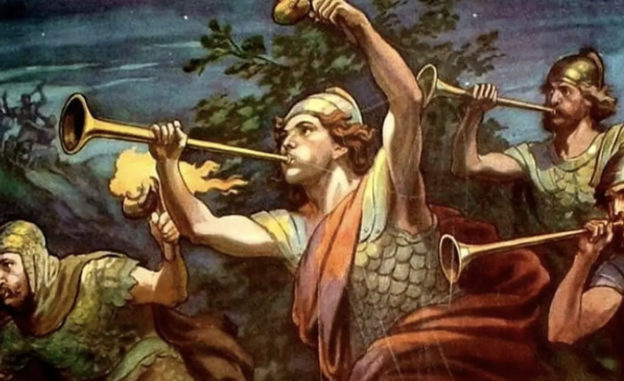Sometimes laughter is the best medicine. Laughter reduces stress, and can make difficult situations bearable. It can bring perspective to sometimes scary and serious problems, and can reduce the lofty ideas of this world to the parody they are.
Judges 3 contains a story which holds plenty of comical relief, along with an element of personal gorishness which surprises and shocks our sensibilities. But along with the comical relief, the story describes a different type of relief; a relief from oppression.
Despite the gore of the story, the story of Ehud the Judge parodies the attempts of the world to grow wealthy through oppressing God’s People. Eventually, judgement comes. Ehud is a saviour for his people, who restores their peace for a time. He points forward to Christ, who in defeating the world will give his people rest for all time, with a down payment enjoyed today.
After Othniel died, “the people of Israel again did what was evil in the sight of the LORD” and God once again sent foreigners to test and discipline Israel for their sinfulness (v.12). Eglon of Moab, together with the Amalekites and Ammonites defeated Israel, and subjected Israel to Eglon’s rule for eighteen years (vv.12-14).
This service came in the form of tribute (v.17), likely substantial amounts of food and the crops of the land. In that situation, the people of Israel would have become very thin, while their conqueror “Eglon was a very fat man” (v.17). Think Jabba the Hutt fat, likely off the sweat of the Israelites.
When Israel came to their senses and cried out to God, he again raised up a Judge to save them (v.15). Ehud was left-handed (v.15), a distinctive from God which would come handy. Assigned to deliver the tribute to Eglon, Ehud made a sword and fastened it to his right thigh, which would not draw attention from guards (expecting a right-handed man with a sword on the left; vv.15-18).
After dismissing the tribute-bearers, Ehud convinced Eglon that he had a secret message, so all Eglon’s guards and attendants would leave them alone (vv.18-19). Ehud then presented “a message from God for you (v.20) in the form of the sword embedded in Eglon’s belly, who was so large that his body swallowed the sword whole (vv.21-2).
To make his escape, Ehud closed the doors behind him, as if Eglon had wanted some privacy (v.23). His servants waited around embarrassingly longly as they assumed he was using the conveniences, until concern overcame hesitance and they discovered Eglon dead (vv.24-5).
In the meantime, Ehud had escaped and rallied the troops at Seirah (vv.27-8). Ehud then led the Israelites down to attack their oppressors “for the LORD has given your enemies the Moabites into your hand” (v.28).
The Israelites seized the strategically important fords over the River Jordan and blocked the oppressors off from reinforcements, before defeating the 10,000 garrison troops to a man (v.29).
From that point on, Moab no longer oppressed Israel but in a classic reversal of fortunes, Moab fell subject to Israel (v.30). As with Othniel, Israel again enjoyed a period of peace and rest, this time for eighty years (v.30).
Of course, the fact that this peace was only for eighty years highlights that it was only a temporary peace. Israel had peace because they had turned to God in repentance and God had delivered them, through Ehud. But they would squander the opportunity given them again, and the cycle would begin again.
While this story is messy and certainly gory, it does remind us that God works in all sorts of situations to achieve his purposes. Even scenarios involving deceit, messy deaths, and an almost satiric retelling and recording into history. Even the absurd is under God’s control, achieving God’s purposes. If God was willing and able to work in the messiness of Eglon’s downfall, God can surely work in the messiness of our own lives.
It also shows that there is a judgement for the world in oppressing God’s People. While Israel’s subjugation was God-ordained because of their sin, it was still oppression of those God loves. Eglon literally grew in largesse through stealing from Israelite mouths. But despite this worldly success, his excess was his downfall.
In the same way, while it may seem today that the oppressors of this present evil age are winning, their success will end and they will be humbled before Christ, as every knee bows and tongue confesses he is Lord to the glory of God the Father.
Ehud’s left-handed stroke brought relief for Israel from its foes. But that relief was only temporary. It eventually ended, because Israel failed to take the opportunity God graciously gave them.
One day, Christ will return to bring permanent rest to all the earth, not just a part. On that day, there will not be any more fresh chances. Today and every day is until then is the day to trust in our own Saviour, Jesus, for freedom from our oppressors.


